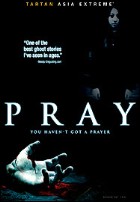
Directed by newcomer Yuichi Sato, Pray is as much a cinematic search-for-self and stylish parable of redemption as it is an eerie piece of exploitation. Clever if structurally uneven, this symbiosis of betrayal, guilt and love achieves an undiluted sense of menace, wrapping a cathartic mystery around the supernatural. Coaxing impressive tension from surprisingly effective actors, Sato interweaves the sordid desperation of crime with a cosmic mystery, plunging viewers into an intellectual arena where knowledge itself is uncertain.
Attacking our dependence on perception, using supernatural possibility and human deception to challenge culturally shared beliefs in the 'appearance' of things, this alchemist's stew evokes sympathy for characters who are as much victims to their fragmented psyches as they are victimizers. Such complexity lends the ghost story the resonance of drama. True to life in its enigmatic shading of motivation and emotional missteps, Pray strikes an empathetic chord that makes its occult manifestations (and its underlying suggestions of human treachery) no more difficult to accept than the nightmarish essence of its abandoned school environment.
Poverty stricken, void of hope or ambition, two youthful criminals -- Mitsuru (Tetsuji Tamayama) and Maki (Asami Mizukawa) -- attempt to fill their wallets by kidnapping a young girl which Mitsuru 'thinks' he randomly chose from a playground. Holding their mysterious young victim in a suitably eerie school which seems to have significance for Mitsuru, they're shocked to learn that the girl has been dead for a year to the day . . .
This begins a seductive descent into self-destruction, deceit, and murder both supernatural and decidedly human. Amidst a backdrop of graphic murders perpetrated by a malevolent spirit, and a conspiracy involving his faithless lover and friends, Mitsuru follows the girl through dark corridors of the school which resemble the even darker byways of his mind. Meanwhile, in a masterful bit of slight-of-hand, a couple seeking to find the whereabouts of their own daughter's spirit are introduced. Further complicating the already convoluted plot, the filmmakers use this additional story-arc as clever misdirection, making certain to justify their involvement in a chiller which is also an ambitious epic of the mind.
With the primal effectiveness of a folktale, this tale of emotional acceptance, spectral revenge, and psychological revelation also focuses on the influence that the past wields over the present. Honoring the tradition of effective supernatural storytelling, grounding narrative events in a believable context of normalcy before allowing the supernatural to invade, the director suspends our disbelief in the cat-and-mouse hysterics of the general premise while taking time to focus on the central character's complex psychology. Careful writing and evocative atmosphere create a macabre context further supported by the physical gloominess of the setting. Unfortunately, the occasionally unbelievable reactions slightly tarnish an otherwise intelligent screenplay. Thankfully the basic premise of Pray -- and the fervor of its director -- compensate for such difficulties.
The most disturbing films of recent memory have rooted their more intellectual subtexts ion the seductive enigma of mystery. Marrying the supernatural and the psychological in a situation equal parts crime story and soap-opera, Pray makes us children in the dark. While the last line of dialogue is unnecessary, distracting from the emotional intensity of the scene that proceeded it, the film remains a satisfying attack against expectation. A solid example of the power of suggestion, this fear film chooses as its central conflicts the malignant power of the past, the consequences of one's actions, and the inevitability of grappling with the unknown, all of which are dissected by a constantly prowling camera.
While the 'look' of this film doesn't at first seem as clean or polished as we expect from Tartan, this is more the stylistic choice of the director than any laziness on the part of the company. Choosing to instil a dark, morose look into a story whose mood of guilt and despair demands such, action is occasionally hard to see and colors, while fresh and vibrant in flashbacks (again, a stylistic choice, I think), are often drained of life in the film itself, perhaps mirroring the despondency of the action. Sound is fine, presented in Dolby Digital and DTS Surround Sound 5.1.
Extras range from the inconsequential to the generous, starting with "Making of Pray," an average featurette of 'behind-the-scenes' footage. While I found myself agitated at the disdain with which Tetsuji Tamayama apparently regards the horror genre (good enough to take a paycheck from though, huh?), the segment is informative, allowing greater understanding of the filmmaker's approach to the material. This is followed by interviews with both the director and actors, discussing feelings about the experience. While not overly informative, this supplement presents these actors as people, not 'characters.' Trailers round out the fearful festivities, including spots for Marebito, Natural City, R-Point, and others.
While audiences with poor attention spans and gore hounds sniffing for blood won't appreciate the somewhat slow pace in which the mysteries develop, and those whose entire summation of the genre is blood, breasts, and beer (fun in their special ways but not quite enough to make a good story!) will cry foul when they realize there is little of the first two and none of the later, Pray remains a good film precisely because it operates outside of the banal dictates of genre. I found the very ambiguity of the premise, and the reflective pace of its construction, lent further depth to its dream-like anti-logic. A story based more on inner turmoil than typical 'boo!` fare, this is a ghost story of the mind!
Review by William P. Simmons
| Released by Tartan Asia Extreme |
| Region 1 NTSC |
| Not Rated |
| Extras : see main review |